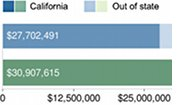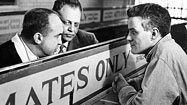Teacher responses to the 2010 release
The following is a list of teacher responses to their "value-added" ratings during the intial release in 2010. See the most recent responses »
The Times gave LAUSD elementary school teachers rated in this database the opportunity to preview their value-added evaluations and publicly respond. Some issues raised by teachers may be addressed in the FAQ. Teachers who have not commented may do so by contacting The Times.
|
|
 Delicious
Delicious
|
 Digg
Digg
|
 Facebook
Facebook
|
 Twitter
Twitter
|





A statistical approach is a great idea if you think of children as numbers. This "value-added" approach is an "estimate" of a child's FUTURE performance that is compared to their TEST SCORES. If someone can predict a child's future, then why can't they use that info to put in place the means to help each child excel in school?
This is a corporate productivity model used to determine if sales are what they should be for products sold. Children are not products and the corporate world knows nothing of education. If a teacher is ranked as "Less effective", what then? In the corporate world strategies are devised to alter the product or the marketing of that product. Snorkels and scuba masks are probably not big sellers in Arizona. Would a company rate its sales staff poorly for not selling mass quantities of snorkels and masks in Arizona? And then threaten to fire them or reduce their pay?Shall we change out our students, or get rid of thousands of teachers that struggle to give our children the best opportunity for a productive future that they can?
So really, what do we do with this information? I know I'm a better teacher than my rating indicates. I try to teach the whole child. I teach life skills and go beyond the standard curriculum. Will that make my students better test takers? No, clearly, by this assessment, it does not. But does it enhance their intelligence and promote citizenship and forward thinking? Yes, I know it does. Will they be better prepared for middle school, high school, and college? Yes, I'm sure of it. Will my student participate in our society as productive citizens? I am giving them the best that I have, and that is more than standard test preparation and any statistical analysis can show.
August 18, 2010 at 11:51 p.m.
Just a couple of thoughts:
a) You write in your FAQ that critics claim that the Value Added Performance is a vast improvement over the "current evaluation system, in which principals render subjective judgment based on pre-announced visits, usually once every few years for less than an hour." If this actually happens in any school, I would like you to write about that principal. Our current and past principals were constantly visiting classrooms, and trying to help struggling teachers. I can not say that they always succeeded, but at least they made an effort.
b) The parents of my students would gladly give up several test points to make sure that I do not stop teaching so many of the life lessons I try to impart to my students. My parents would also gladly give up test points to make sure I don't stop arranging field trips, don't stop bringing in guest speakers, don't stop staying after school to help students with their homework.
c) But most importantly, how many points do I lose for making my students enjoy coming to school, how many points did I sacrifice because I wanted to impart a love of reading to my students, instead of teaching to the test. How many points did I lose for trying to do the job that I feel is the most important part of my job... creating "learners" not test takers, building productive citizens not "multiple choice quiz takers. Because I do the "important" things, the staff, administrators, students and parents consider me a "highly effective" teacher... no matter what your results may show.
PS. I would love to discuss the methodology used. There are so many questions I would like to ask that are not answered in your FAQ. I am also willing to discuss "highly effective teachers" with your journalists.
Sincerely,
Steve Reidman
818 298-1334
stever3@earthlink.net
sreidman@lausd.net
August 18, 2010 at 10:45 p.m.
Even though we are on summer vacation I went to my school today to get my classroom ready. Interestingly enough I just received THIS YEAR'S CST scores. For this year (2010) 59% of my Fifth grade math students passed. 25% of them passed LAST YEAR. My added value would be 34 %. The average kid raised their scaled score by over fifty points. This would put me in the MORE EFFECTIVE category for 2010. I had 3 special ed students who raised their test scores. I had 2 girls who were separated from their families by child protective services who raised their scores by over sixty points. I had one child who stole from my desk and who missed more than thirty days of school who also increased his scores. I had a girl who missed over twenty days of school and who was in court frequently because her mother's boyfriend was going to prison increase her scores by 176 points. She went from far below basic to proficient. I had a super bright child who came up with a new way to add fractions whose test score went up 171 points. One day this year I was walking through the yard and a girl was choking and no one knew what to do. I did the steps of our emergency training and ultimately stuck my hand into her mouth and pulled out some blood and some food. She was more scared than injured. I emceed the school Halloween parade this year. I did this in English and Spanish and we raised money for the kids. I ended up buying ten pizzas for the kids who stay after school until six because their parents are working. I have about fifty phone numbers of parents in my phone because that is what we teachers do. I spearheaded a bathroom clean up project and was there on Saturday for beautification day and got twenty strangers to sponsor our class for Christmas and the kids received over nine thousand dollars worth of gifts. My wife and I even kicked in about five hundred dollars because we wanted those poor kids to have a Christmas to remember. That is what we teachers do. For test taking time my wife goes to Starbucks and gets the extra pastries they normally throw out every night and we give the kids a treat. From 2002 until last year I took about two years of post graduate courses that cost me well over fifteen thousand dollars. If I did not take the courses I would have been fired. That is what we teachers do. To help pay for the courses I took side jobs in addition to my teaching job. Last year was the first time I was free to simply teach. And my test scores skyrocketed. And that is commendable. However I think that being a good teacher is also about shedding tears with a parent until darkness falls because that parent is terrified that her daughter is on drugs. It's about making the entire campus better. Not just your little room. It's about helping the 200 pound second grader who is fighting and bringing him into your fifth grade class to give him a fresh start. It's about being positive and being informed. It's about spending your own time and money on people you may never see again. It's about taking the time to talk to kids who come back to you after they have graduated and they want to say they enjoyed your class. It's about going out to the yard during your break time and lunch time because you want the kids to know that you are always around and available. My job is about making great kids and I take that, very seriously. Numbers and stats have great value and some say teaching is a science but teaching is also an art. It's about emotions, feelings, instincts, relationships, patience, perseverance and a sense of humor helps. It is about reaching into the souls of children. What number or test score do you use to measure that? Sometimes the movies that make the most money are not the best movies. They do not make us better humans. Sometimes the numbers only tell part of the story. Shame on you, Los Angeles Times. Just because your numbers are low does not mean that you become low.
August 18, 2010 at 10:44 p.m.
The Rand Corporation itself has denounced VAM as unreliable in judging teacher effectiveness using the California Standards Test, as the CST is not a vertically scaled test, does not measure student growth from year to year, and is particularly unstable for students at the highest and lowest ends of the academic spectrum. The researchers also noted that "it is impossible to fully separate out the influences of students' other teachers, as well as school conditions, on their apparent learning." The fact that my students excel in subsequent years is proof that I did my job, not vice-versa. Former education secretary, Diane Ravitch states that people who judge teachers solely by their test scores know nothing else about education. Fortunately, the parents at my school are smart enough to know when their children are learning.
August 18, 2010 at 10:23 p.m.
Personally (and rather secretly) I believe that publishing scores is a good thing. I have always done my best professionally. The lack of dedication to improvement that I see in my colleagues is frustrating to say the least, especially when I'm digging in with all my heart to constantly improve and respond to my students. I was curious to see where I fit on your scale. I think I'm an outstanding teacher, but I could have been wrong! So this validates my hard work. It also makes me want to improve my teaching in reading. We are public employees. I think that if you are doing the best that you can at your profession, then you should have nothing to hide and your work should be public. I've always had an open door policy. I never mind when I'm observed (which is frequently) and I never can understand my colleagues fear and nervousness regarding other teachers and administrators watching them. Come on over to my school and I'll show you some other outstanding teachers!
August 18, 2010 at 9:52 p.m.
I was disheartened to see that I was rated "Less effective than average" overall for a three year period when I taught 3rd, 4th, and 5th grade. In 2004 I taught 3rd grade and it was a difficult year, but I tried my best. In 2005 I taught a 4th grade class that was part of the Special Ed. Inclusion program. On my roster I had three special day class students that stayed with me during all academic subjects and after lunch went to the Learning Center. In 2006 I was given the same class, because our school was following a program where teachers stayed with their students for two consecutive years. Within this same class I referred 3 other students to be tested for special education services. Two of the students qualified because they had learning disabilities. I remember one had a disability in math. Much of my time was spent individualizing instruction for the special day class students and the other students. The Inclusion program was being piloted at my school and there were many problems. The special day class teacher who worked with the students in the afternoon at the Learning Center was a brand new teacher. I remember that the special day class students didn't score well on the CST tests, but that is why they were in special ed. The other regular ed students in my class did well on the CST tests. Were the special day class students' scores used to rate my effectiveness? I may not have been effective in raising their math and English scores, but I do know that they felt happy being in a regular class and that the other students were accepting of them. Those were two very productive years with a tremendous amount of learning and joy for all students. I have taught every grade from pre-school to 7th grade. I taught 1st grade for 8 years and experienced the joy of teaching reading. The love of learning is what I teach and that cannot be measured by a CST test score. I tell my students each year and I truly believe this to be true, " A test score can never measure how very wonderful and unique that you are as a person." I will try to heed my own words, because the rating of "Less effective than average overall" stabbed me in the heart.
August 18, 2010 at 9:47 p.m.
Please exclude the poor and minority students from my classroom data and I can assure you that I am a highly effective teacher - but then I would not have a job.
August 18, 2010 at 9:38 p.m.
I believe this rating system attempts to quantify the aspects of teaching with good intentions, but I consider the teaching profession both an art and a science that is inherently difficult to quantify. The testing data that was used to determine these ratings is important data, though cannot reflect all that is involved in well-rounded teaching or learning, nor does take into account all the variables that affect class test scores. Just as I use multiple ways to determine the aptitude of my students, test scores are just one component of the learning and growth that goes on in my classroom.
August 18, 2010 at 9:33 p.m.
no comment
August 18, 2010 at 9:04 p.m.
Yes, teachers should be held accountable for children's education, but more importantly (and you probably won't print this because it's politically incorrect,) but PARENTS need to also be held accountable! I'd love to see a, "value added measure of performance" for parents.
August 18, 2010 at 8:46 p.m.